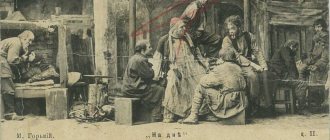The theme of truth in Gorky’s play “At the Depths” - Luka
The author assigned the image of a wandering man at the age of sixty to Luke. He came to the shelter recently; other characters in the play have already lived here for a long time. What is Luke's truth based on:
- Compassion for one's neighbor;
- The need to sincerely believe in God;
- Hope for the best in any situation;
- White lies.
After meeting the guests of the shelter, Luka enters into a debate with them. He tries to console every disadvantaged person and instill faith in a bright future for doomed people. The actor suffers from alcoholism - Luka recommends him a hospital where they will help solve his problem. Ash receives advice to go to Siberia.
Anna’s truth in the play “At the Bottom” characterizes her as a hunted, downtrodden woman. She is dying of a serious illness, dreams of death in order to be freed from torment. Luka is trying to instill in her faith in the afterlife, where she will find peace and happiness. The main opponent in the dispute with Luka is Bubnov.
The naked truth of Bubnov in the play “At the Lower Depths”
Bubnov is thoughtful and accurate with his words, he denies the possibility of any disguise: “No matter how you paint yourself on the outside, everything will be erased.” Moreover, he asserts in himself and other “poor fellows”, deprived of “embellishments”, the exposure of the human essence: “... everything faded away, only one naked man remained.” It is not by chance that Gorky dwells on this thought. Due to the complete loss of any kind of activity, the severance of connections between themselves and the whole world, the “tramps” really bypass specifics and gravitate towards some general concepts. The playwright creates images of “reluctant philosophers.”
Moreover, he does not exaggerate at all and strictly individualizes their abilities. The “involuntary” philosophy of the characters directs the internal movement of the play. The search for Mite, Ash, Natasha, Actor, Nastya, Tatar, Anna had a unique impact on the “theories” of achieving happiness that were fashionable at the turn of the century. Bourgeois ideologists repeated in different ways the supposedly saving recommendations: honest work, worship of the strong will of the hero, service to art, love, enriching meager days with human conscience and faith. Let's take a closer look at the heroes of "At the Bottom". In them, although in a very reduced version, just such illusory impulses appeared. Is it not through hard work that Kleshch wants to achieve success? Is it not love that Nastya is reaching for as protection from real horrors? Isn’t Anna’s gaze turned to God? Is Natasha waiting for a hero? Without realizing it, they all dream of what should truly be the essence of a normal life. But in reality, which destroys beauty and truth, natural impulses are also doomed to death.
In the reasoning, the fate of the “tramps” is the answer to the most difficult question about the nature of man and society. Gorky debunked the erroneous ideas of his time as an inability to give rest to the unfortunate under a vicious world order. For the writer, Luke was unacceptable because with his lies he slowed down insight, interfered with the elimination of mistakes, and instilled passivism.
In 1928, Gorky wrote: “Comforters, preachers of reconciliation with life are hostile to me.” In acute psychological collisions, the artist embodied the clash of different points of view on existence and consciousness, the victory of an active attitude towards the world. That is why “At the Bottom” is a socio-philosophical drama. Any, the most ordinary actions and sayings of the inhabitants of the Kostylevo shelter are imbued with great meaning. The widow Kvashnya is proud that she is “her own boss.” But this concept includes not only the joy of liberation from the oppression of a cruel husband. Important
Lesson on the topic Three truths in the play by M. Gorky At the bottom, grade 11
Topic: “The dispute about the truth and the purpose of man in A. M. Gorky’s play “At the Depths”
Goal 1. Based on the analysis of the play, identify three truths of the characters in the work.
2. Reveal the problem of true and false humanism.
3. Identify the author’s position in the play.
During the classes
- Teacher's word. In an interview about the play “At the Lower Depths” in 1903, M. Gorky defined its meaning as follows: “The main question that I wanted to pose is: what is better, truth or compassion? What is more needed? Is it necessary to take compassion to the point of using lies, like Luke? This question is not subjective, but general philosophical.”1 At the beginning of the twentieth century, the debate about truth and comforting illusions was associated with a practical search for a way out for the disadvantaged, oppressed part of society. In the play, this debate takes on a special intensity, since we are talking about the fate of people mercilessly thrown overboard by society.
— Is there an event in the plot of the play that affects the lives of the night shelters as a whole?
- Yes, this is Luka’s arrival. He not only settled nearby. But somehow he entered the lives of each of the inhabitants of the basement.
— What changed in the shelter with the arrival of Luka? What attracts people to Luke?
“With his arrival, it became warmer and more comfortable. He attracts with his friendliness (examples from the text), genuine interest in people, and sociability.
— How does Luke’s speech characterize him?
— Luka is an experienced psychoanalyst; he knows how to listen carefully to people and accurately evaluate them. He doesn’t come up with any recipes for the night shelters, but only skillfully supports the dream in each of them. Responds to Anna's request to talk to her. He understands Nastya, who is tossing around in anguish, supports her illusions, protects her from the Baron’s ridicule. The actor is convinced that he can start all over again. Ash is kept from killing, which could ruin his life.
- Prove that Natasha, Nastya, Anna, Ashes are grateful to Luka.
L.N. Tolstoy, after reading several scenes of the play, remarked: “Your old man is unlikable, you don’t believe in his kindness.” What in Luka’s behavior could have alerted Tolstoy?
— His behavior in the episodes: “The Beating of Natasha”, “The Murder of Kostylev” is alarming.
—What is Luke’s truth, how is it revealed in the parable of the “righteous land”?
“He tells a parable to prove that hope, even illusory, gives a person strength to endure adversity. It can be so difficult that “even if you just lie down and die,” a person will remember about the “righteous land” and cheer up: “Nothing! I'll be patient! A few more, I’ll wait... and then I’ll give up this whole life and go to the righteous land...” And when I found out that there was no righteous land anywhere, hope collapsed - and the man hanged himself. The truth turned out to be disastrous for him.
— How does Natasha feel about this story?
“Natasha believes that it is not the truth that is destructive, but deception.”
— Let’s consider Bubnov’s attitude towards the person. He belittles a person, admits his powerlessness. His truth is no better than a lie.
Does the author agree with Luka and Bubnov? How is the author's position manifested in the play?
— The author’s position is revealed in the depiction of the destinies of people whom the old man “lured somewhere, but did not show the way.”
— How does the fate of the Actor reveal the author’s position?
— Gorky assures that false hope can lead a person to a noose. But still, the author is far from placing all the blame for the death of the Actor on Luka. The actor accuses Luka of not leaving the address of the free hospital.
— Many heroes agree that Luke deceived them. Did he promise to bring them out of the bottom of life? He simply supported their belief that there was a way out. Was the self-confidence of the homeless shelters strong? Is Luke the only one to blame for their tragedy? To whom does the author address the main accusation? Of course, the inhabitants of the shelter, who were unable to oppose their will to reality. They do not fight circumstances, but go with the flow. Which of the characters expresses Gorky's position? How does this position manifest itself?
— Respect for a person, instead of pity.
So there are three truths in the play: Bubnov’s truth, which humiliates a person and recognizes his powerlessness; Luke’s truth, based on illusory daydreaming, and Gorky’s truth, based on respect for man, recognizing his strength and greatness. Why does Gorky trust Satina to deliver a monologue about a person?
“Among bottom people, he stands out for his intelligence and ability to reason. The Baron seeks justice from him, Bubnov calls him a smart girl, Kleshch says that Satin “knows how not to offend.”
— Thus, the problem of true and false humanism is connected with disputes about truth.
Luke, pitying people, does not believe in their ability to change their lives and sows illusions that lead away from the truth. Gorky believes in man, in his strength, intelligence, will, and ability to influence the course of life.
Homework. Answer in writing the question: “Whose truth is close to you and why?”
1 Bialik B. A. A. M. Gorky - playwright. - from 55.
Summary of a lesson on literature “Three truths in M. Gorky’s play “At the Depth.”
Abstract
Lesson topic: Three truths in M. Gorky’s play “At the Bottom”.
Goals:
Educational: find out the meaning of the tragic collision of different points of view: the truth of a fact (Bubnov), the truth of a comforting lie (Luke), the truth of faith in a person (Satin);
Developmental: developing public speaking skills, the ability to defend one’s point of view.
Educational: cultivate a sense of empathy.
During the classes
1.Checking homework.
Group 1 (heroes who have come to terms with their existence) - Bubnov (convinced that all people on earth are superfluous), Kvashnya, Baron (lives with his past), Satin, Alyoshka, Crooked Zob, Tatar.
Group 2 (heroes who want to get out of the bottom) - Natasha, Vaska Pepel, Nastya, Actor, Kleshch.
Luke is a hero who keeps to himself.
2. In the play, two conflicts occur simultaneously. Name them.
1 is a love conflict between Kostylev, Vasilisa, Vaska Pepl and Natasha)
2 is a conflict of heroes arguing about the purpose of man (Bubnov, Satin, Luka) -
What conflict takes place off stage?
(Lover. The fight between Vasilisa and Natasha, Vasilisa’s revenge - overturning a boiling samovar on her sister, the murder of Kostylev takes place around the corner of the flophouse and is almost invisible to the viewer).
The second conflict, on the contrary, is constantly unfolding on stage.
What is the main leitmotif of the play? (A leitmotif is an expressive detail, a specific artistic image, repeated many times, mentioned, passing through a separate work or the entire work of the writer). Which character is the first to formulate the main question of the drama “At the Bottom”?
The debate about truth and meaning will be heard already on the first page of the play, in Kvashnya’s remark: “Ah! You can’t stand the truth!”
(find and read the dialogue between Kvashnya and Kleshch).
The first words about truth belong to Kvashnya, but still the main characters arguing about the meaning of truth will be Bubnov, Satin and Luka.
Let's remember the meaning of their names again and write it down in a notebook. (slide presentation)
We see Satin and Bubnov right from the beginning of the play, but how does Luka appear? (Natasha leads him, fragment of the film at 21:30 min.)
Does Luke tell anything about himself? (Nothing except that he is a wanderer, a fragment of the film for 21 minutes.)
How do the residents of the shelter treat him? (Natasha behaves kindly and respectfully with him, shows him a place where he can settle down, the Baron calls him a kikimora, Vaska Ash scolds him for singing poorly).
Is Luke offended by any of them? (No, because he is wise and tries to find an approach to everyone).
After his appearance, Luka tries to console the inhabitants of the shelter and give them advice. Who does he console and what does he advise?
1. consoles the Actor, talking about the hospital for drunkards (film fragment for 6 minutes)
2. comforts the dying Anna (film fragment at 03:50 min.)
3. advises Vaska Ash to go to Siberia, to the “golden side” (film fragment at 09:39)
4. consoles Nastya when none of the shelters believe in her love story.
Remember the story from life that the old man tells when he served as a watchman near Tomsk. What moral did he take from this story? (Christ felt sorry for everyone and ordered us to do so... I’ll tell you - it’s time to feel sorry for a person... it happens well! Prison will not teach you goodness, and Siberia will not teach you... but man will teach you... yes! Man - can teach goodness... very simply!)
Let's remember the story of the righteous land that the old man told. What's the point of this story? (The moral is that a person needs to believe in something, even if it is not true, otherwise life will lose meaning).
Bubnov is the antipode of Luka, who was he before he slipped “to the bottom”? (Furrier, dyed furs, worked in a workshop)
What does Bubnov answer when they ask him if you have a conscience? (What's the point of conscience? I'm not rich...)
During the conversation between Vaska Pepel and Natasha, Bubnov repeats the phrase several times in a drawn-out manner: are the threads rotten that these words express? (distrust, doubt about Vaska Ash’s serious intentions).
What proverb characterizes life in the Bubnov shelter? (Life is such that you get up in the morning and howl)
Throughout the play, Bubnov utters the following phrases: “All people on earth are superfluous...” “All fairy tales...” “Everything is like this: they are born, they live and they die. And I will die... And you...” What did he want to say with these phrases? (All people are doomed to suffer, so there is no need to lie to people about a better life, let everything remain as it is)
How does Bubnov feel about Luka? (Mm... People like to lie... Well, Nastya... it’s understandable! She’s used to painting her face... so she wants to paint her soul... it puts a blush on the soul... And... others - why? Here - Luka, approximately... he lies a lot... and without any benefit for himself... The old man... Why would he?)
Now let's talk about the truth of Satin's life.
Who was he in his youth? (worked as a telegraph operator, read books and was an educated person, according to him)
How did he get to the shelter? (killed a man for his sister, after prison he ended up in a shelter).
Find Satin’s monologue in the text and read it. What is Satin’s position in life? (All the power lies in man, that on earth there is only one truth - this is man himself, everything on Earth is the creation of his hands)
Satin thought absolutely opposite to Luke, but why, when the Baron called the old man a charlatan, did Satin stand up for him? (He lied... but it was out of pity for you, damn you! 02:13 min)
How does the play end? (Actor's suicide)
Why does Satin say this line: Eh... ruined the song... stupid cancer! (Because at that moment, when all the night shelters sang the song, they felt like one whole, felt hope for something better, and the Actor’s suicide again returned them to the same bottom, fragment of the film at 12:30 min.).
3. So, we have found out with you all three truths of the play. Tell me, what point of view do you adhere to? Can a lie be saving, comforting, or should you always tell only the truth, even if it is bitter and cruel? Which side will you take? On the side of Bubnov, Luka or Satin? Is the play “At the Bottom” relevant for our time? Or is it outdated long ago and shouldn’t be shown on stage?
Three “truths” in M. Gorky’s play “At the Depths”
Essay based on the play “At the Depths” by Maxim Gorky on the topic:
Three “truths” in M. Gorky’s play “At the Depths”
The title of Maxim Gorky's play surprisingly accurately reflects its content. The heroes of the work are truly at the very bottom of their lives, not only in terms of their way of existence (they live in a shelter, drink, many do not have jobs), but also in the spiritual aspect: people have lost hope and faith.
The play has three ideologue characters with clearly defined positions regarding the truth. Satin, the first of them, sees truth in man, man as truth itself. He says: “What is the truth? Man - that's the truth! Lies are the religion of slaves and masters... Truth is the god of a free man!” According to Satin's concept, people live for something better, and the truth lies within themselves. A person is free, he is above everything, he must be respected and not humiliated with pity, despite the fact that he is a thief or a swindler.
The position of the second hero, the wanderer Luke, in many matters is similar to the position of Satin. For him, the person is also important, what he believes in. “A person must respect himself, what you believe in is what you believe in.” To say that Luke is lying is perhaps not entirely true. He gives the heroes hope, faith, a dream, and returns the ability not to give up on the path to their goal. Thanks to Luke's stories, even the Actor, despite the sad ending, stops drinking for a while and takes the path of correction. Luke’s position is also revealed by the story “about the righteous land,” which he tells in the shelter. Its moral is that you don’t need to look for this righteous land on maps and globes, you need to look for it in yourself, it is in each of us.
The third truth in the play is Bubnov’s truth. His position is the truth of the fact, truth as the absence of lies. In his opinion, “people all live like chips floating on a river” - they are unable to change anything, all people are born to die. “But I don’t know how to lie. For what? In my opinion, leave the truth as it is! Why be shy,” says Bubnov. “No matter how you paint a person, everything will be erased,” a person is incurable and he should not try to change something in himself, he is completely dependent on the environment from which he cannot get out - the meaning of Bubnov’s beliefs.
Colliding and interacting with each other, the three truths surprisingly organically show the reader the inner world of the flophouse. This also reveals the position of Gorky himself, who is a sharp opponent of Tolstoy’s position of non-resistance to evil and Dostoevsky’s humility. “Man—that sounds proud,” says Gorky through the mouth of Satin. However, the author's position is more complex than it might seem at first glance. M. Gorky’s own worldview is a combination of the comforting truth of Luke and the truth of the man Satin.
The play “At the Lower Depths” is still in the repertoires of many theaters, because it is relevant at all times, its problems are eternal, and Gorky’s view of man as one who “must become God himself, if God is dead” attracts viewers with its decisiveness and power.






